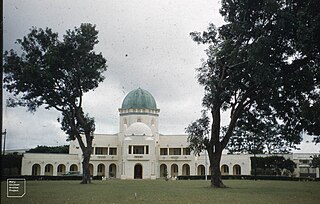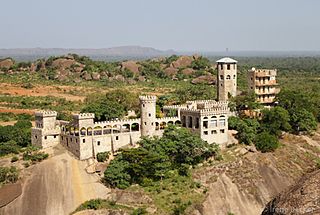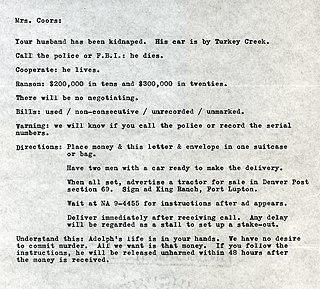
Kaduna is the capital city of Kaduna State, and the former political capital of Northern Nigeria. It is located in north-western Nigeria, on the Kaduna River. It is a trade center and a major transportation hub as the gateway to northern states of Nigeria, with its rail and important road network.

Kaduna State is a state in the northwest geopolitical zone of Nigeria. The state capital is its namesake, the city of Kaduna, which was the 8th largest city in the country as of 2006. Created in 1967 as North-Central State, which also encompassed the modern Katsina State, Kaduna State achieved its current borders in 1987. Kaduna State is the fourth largest and third most populous state in the country, Kaduna State is nicknamed the Centre of Learning, owing to the presence of numerous educational institutions of importance within the state such as Ahmadu Bello University.

Nigerian Railway Corporation is the state-owned enterprise with exclusive rights to operate railways in Nigeria.

Kajuru is a local government area in southern Kaduna State, Nigeria. Its also headquarters is in the town of Kajuru. The local government is located on longitude 9° 59'N and 10° 55'N and latitude 7° 34'E and 8° 13'E, with an area of 2,229 km2.

Between 23 and 25 June 2014, a series of attacks occurred in central Nigeria. On 23–24 June, gunmen attacked a number of villages in Kaduna State, killing around 150 people. The attack was blamed on Fulani tribesmen. On 25 June 2014, a bomb exploded at the Emab Plaza in the national capital of Abuja, killing at least 21 people. In response to the bombing, the Nigerian military raided two militants camps on 26 June, killing more than 100 people.
The following lists events from 2014 in Nigeria.
Herder–farmer conflicts in Nigeria are a series of disputes over arable land resources across Nigeria between the mostly-Muslim Fulani herders and the mostly-Christian non-Fulani farmers. The conflicts have been especially prominent in the Middle Belt since the return of democracy in 1999. More recently, they have deteriorated into attacks on farmers by Fulani herdsmen.

On February 10–11, 2019, 141 people were killed in the Kajuru LGA of the Nigerian state of Kaduna according to the state governor, hours before the Nigerian general election. The dead included 11 Adara people and 130 Fulani. However the Fulani group Miyetti Allah was reported to have published a list of 131 Fulani who had died and it also stated that the bodies of 66 Fulani were recovered while the bodies of 65 other Fulani remained missing. An attack by suspected Fulani gunmen on Ungwar Bardi killed 11 Adara people. An Adara militia in turn attacked Fulani settlements. Miyetti Allah later clarified 66 were buried in graves and 65 remained missing.

Kidnapping is a major problem in Nigeria in the early 21st century. Kidnapping by bandits and insurgents is among the biggest organised or gang crime in Nigeria and is a national security challenge.
His Royal Highness Maiwada Raphael Galadima was the monarch of Adara Chiefdom, a Nigerian traditional state in southern Kaduna State, Nigeria. He was known by the title Agom Adara III.
On 24 and 25 February 2021, bandits killed 36 people in Kaduna and Katsina State of Nigeria.

The bandit conflict in northwest Nigeria is an ongoing conflict between the country's federal government and various gangs and ethnic militias. Starting in 2011, the insecurity remaining from the conflict between the Fulani and Hausa ethnic groups quickly allowed other criminal and jihadist elements to form in the region.
Events in the year 2022 in Nigeria.
On 28 March 2022, an Abuja–Kaduna train was attacked in Katari, Kaduna State, Nigeria. In response, the Nigeria Railway Corporation (NRC) briefly halted operations along the route.

On 10 April 2022, a gang of bandits killed more than 150 people in a series of attacks in Plateau State, Nigeria. The attacks are linked to the ongoing Nigerian bandit conflict. About 70 people were also kidnapped in the attacks.
On 5 June 2022, alleged Fulani militants killed thirty-two civilians in four villages in the Kajuru area of Kaduna State, Nigeria.
Events in the year 2024 in Nigeria.
The immediate origins of killings in Southern Kaduna especially in the 2010s and early 2020s can be traced to the events that brought in Goodluck Jonathan into power in 2010 as the President of Nigeria, and escalated after the presidential election in 2011, which he won.










